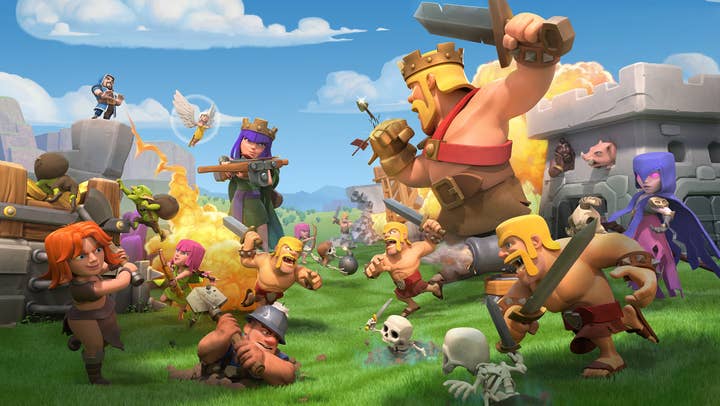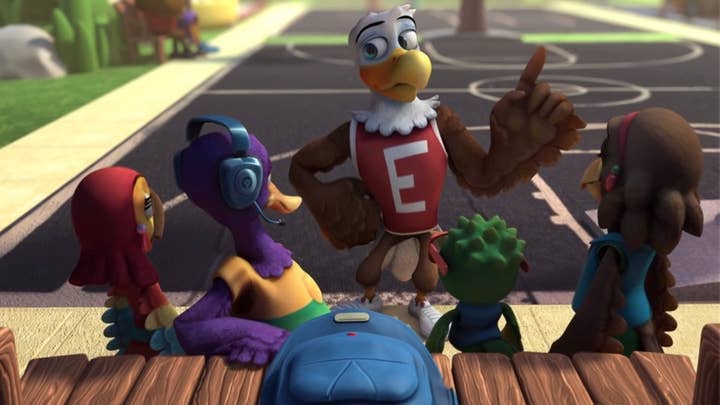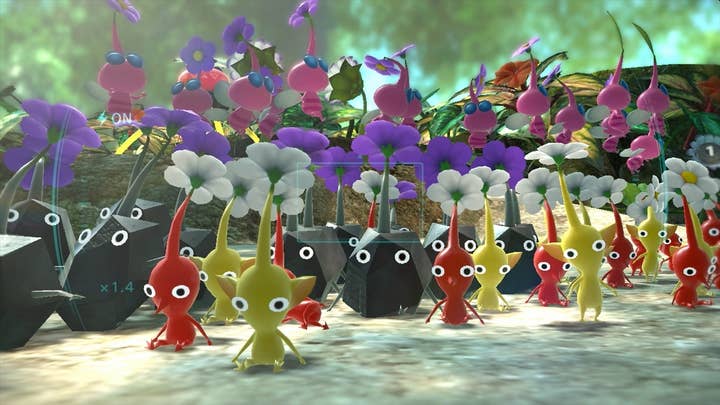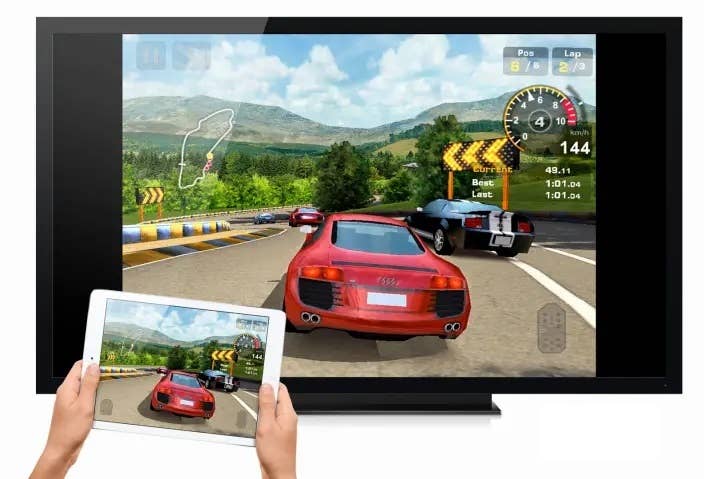Change that tune | 10 Years Ago This Month
Future Unity CEO John Riccitiello decries money-focused game makers, we agree with an NRA lobbyist, and other unexpected occurrences
The games industry moves pretty fast, and there's a tendency for all involved to look constantly to what's next without so much worrying about what came before. That said, even an industry so entrenched in the now can learn from its past. So to refresh our collective memory and perhaps offer some perspective on our field's history, GamesIndustry.biz runs this monthly feature highlighting happenings in gaming from exactly a decade ago.
If we're looking at the big news from July of 2013, I'm not sure it gets any bigger than Don Mattrick's shock departure from Microsoft after the disastrous reveal of the Xbox One and its planned digital restrictions. But checking the archives, that saga has been the column's lead story for three months running now, so let's give Microsoft a pass this month and take a stroll through the rest of the month's headlines.
We got RiccitielloRolled
"John Riccitiello slams 'opportunists' who just want to profit from games"
That was the headline for James Brightman's interview with John Riccitiello, the first chance we'd had to speak with him since he resigned as CEO of Electronic Arts because the company's digital turnaround was taking too long.
Temporarily free from the constraints of an employer, Riccitiello came out swinging over the state of the industry, so much so that we'll just excerpt a few paragraphs from the original article here to preserve context.
"What I don't like in the games industry today is that there are too many opportunists who are there to make money"John Riccitiello, in 2013
"Let's be realistic. I'm going to be cynical for a minute. I find this terribly hilarious — you talked about game companies, things you write about on the website, these game companies who are going to create the next generation of new ideas, they're all about fun etc. And they're working on a Puzzles and Dragons rip-off, except they're going to change one of the colors to blue. I mean, wait a minute. Are you in this because you want to create something or does it look like the easiest way to make money is to take one of the top-ten games and tweak it?" he said.
"One of the reasons we're seeing a lot of stuff that looks alike and plays alike is because that's how a lot of stuff gets born. It gets funded that way," he continued. "I think we're going to start seeing a lot more differentiation as people get bored of seeing the same apps in the top 200. They're going to come at it and realize that if you don't make a fundamentally different product then it's very difficult to replace something that's up there with your own original design."
Riccitiello added that the reason people should get into the games industry is to see their big creative visions through — if you make something great, the profit could follow. "What I don't like in the games industry today is that there are too many opportunists who are there to make money," he said.
Riccitiello sings a somewhat different tune these days as the CEO of game engine maker Unity, which under the executive has expanded from a tool to help developers make games to a service that helps developers make and monetize games.
In an interview right after Unity acquired app monetization firm IronSource last year, Riccitiello dismissed developers who weren't thinking about monetization from the outset, saying, "It's a very small portion of the gaming industry that works that way, and some of these people are my favourite people in the world to fight with — they're the most beautiful and pure, brilliant people. They're also some of the biggest fucking idiots."
It's not surprising that Riccitiello didn't hold onto his 2013 criticisms of money-motivated developers considering the transformation of Unity under his stewardship. It's much more surprising Riccitiello didn't realize his criticism of creativity-motivated developers would be every bit as unwelcome. (He later expressed regret for his remarks.)
So aside from his new position running a business that relies on developers to focus on monetization from the word go, what changed for Riccitiello?
It may surprise you to learn that the truth of a person's heart is rarely found in quarterly reports and SEC filings, so we're forced to speculate. But that 2013 interview does include some other concerns of Riccitiello's that don't hold much water in retrospect.
Mobile was a particular issue for Riccitiello, as he discussed in the interview how mobile gaming in particular was at risk of "blowing up its brands" from a combination of abusive monetization and a penchant for riding the same game instead of building a brand through sequels and the like.
"It's like we just grind [players] and bleed them by either the back end or quantitative marketing"Riccitiello, on mobile games
"I think people expected it to work like popcorn where the bottom kernels popped up to the top and it would just be recycled this way, but for how long have we seen Candy Crush and Clash of Clans at number one and number two? 200 days now?"
"What we are doing with mobile games today is I think we cause the user to play it almost to the point where they want to take their iPhone or iPad or their Android phone and throw it through a window, because it's like we just grind them and bleed them by either the back end or quantitative marketing. You might be happy to be lifetime revenue optimized for six months but there's a point that it gets pretty exhausting. You feel grinded, I think," he said.
Similar to his Casual Connect discussion, Riccitiello wondered aloud if mobile is really producing lasting franchises at this point: "This year EA will ship Madden 25, and franchises like The Sims and Sim City and Need For Speed and FIFA are all past the decade mark, if not approaching the 20-year mark. And they're still long lived and each successive product does better than the one that preceded it... What did they do that allowed them to have ten-year anniversaries, 15-year anniversaries and 25-year anniversaries? And do we think that there'll be 25-year anniversaries around some of the games that are chart topping in mobile?"
Riccitiello was amazed that Candy Crush and Clash of Clans had survived at number one and number two on the mobile charts for the better part of a year. That simply didn't happen in the console world of the time.
I wonder if Riccitiello would have believed those games would still be dominant a decade down the line. Earlier this week, data.ai had Candy Crush Saga as the number two iOS gaming app by revenue, with Clash of Clans at number five. And while many of their players may feel grinded by the back end or quantitative marketing empowered by services like Unity's, they're not churning out. At least not the ones who pay, and not in numbers big enough to hurt the bottom line.

Riccitiello was not alone in thinking about the mobile market through the lens of the console gaming world, where the natural order of things had been to replace games with sequels rather than keep them in a state of permanent renovation.
In 2010, Activision Blizzard CEO Bobby Kotick said the App Store wasn't a big opportunity for dedicated games.
In 2013, in between Riccitiello's exit from EA and our interview, Kotick was brushing aside a question from analyst Doug Creutz about whether the company should rethink its strategy given titles like Clash of Clans had been sustaining impressive revenues for the better part of a year.
"I don't think we exactly share your view that three months suggests that they're sustainable franchises"Bobby Kotick in 2013, on mobile hits like Clash of Clans
"I think we've always said we're constantly exploring all different platforms for opportunities, but I don't think we exactly share your view that three months suggests that they're sustainable franchises," Kotick told him. "If you look at the last four or five years, you've seen changes in the top ten almost every year that are significant. Nothing that's driven any sizable amount of operating profit. While we're going to continue to look at it, and we think that over the long term there'll be opportunities, right now we just don't see anything that would suggest that changing the way we approach investing against mobile would be a good idea."
Kotick certainly came around on mobile, as Activision Blizzard would spend $5.9 billion to acquire Candy Crush maker King a couple years later. Presumably Riccitiello has likewise become a believer given the importance of mobile gaming to Unity's business.
Coincidentally, the Riccitiello interview also includes a little bit of critical assessment of Activision Blizzard, not for its reluctance to get into mobile but seemingly more for its reliance on a handful of properties.
"There's one scenario where they ship a new MMO, it replaces WoW, Call of Duty stays at the top of the charts, Skylanders goes from strength to strength," Riccitiello said. "They do a couple of things with their licenses, everything goes fine. Then there's a scenario where WoW continues to decline, Battlefield takes the mantle from CoD, Skylanders proves to be a flash in the pan and Activision proves to be a shitty company at that point."
As we now know, Activision Blizzard never did ship another MMO to replace World of Warcraft, Call of Duty did stay at the top of the charts, and Skylanders went from strength to The Phantom Zone to serve out a life sentence in the prison dimension alongside fellow inmates Guitar Hero, True Crime, and Tony Hawk.
"The one thing I know most about now is Battlefield and CoD and I feel pretty confident that EA's got better cards"John Riccitiello, in 2013
Despite going one-for-three on Riccitiello's best-case scenario, Activision Blizzard has still done pretty well thanks to the extension of Call of Duty, Blizzard back-up in the form of Overwatch and Diablo, and the King acquisition.
In fact, judging from Riccitiello's comments, the continued success of Call of Duty would have been the biggest surprise to the executive, who was at that point still a true believer in EA's efforts to dethrone the shooter king with Battlefield.
"The one thing I know most about now is Battlefield and CoD and I feel pretty confident that EA's got better cards," Riccitiello said. "But the last billion-dollar brand created from scratch in this industry was Skylanders. Is the next billion-dollar brand going to come from Activision? I don't know. But if it does then they can sustain the loss of leadership in the field of shooters."
Amateur hour

The NCAA in July of 2013 gave up on video games, announcing that it would not renew its contract with EA Sports "given the current business climate and costs of litigation" of making games trading heavily on digital approximations of uncompensated student athletes. The series featured no names or likenesses apart from cover stars who had just recently turned pro, but you could usually count on key positions from each team matching the size, skin color, ability set, and jersey number of their real-life student athlete counterpart.
NCAA Football 14, which had just been released at the time of the announcement, would serve as the swan song of EA's 20-year line of college sports titles, which also included more than a dozen NCAA March Madness/NCAA Basketball titles and even a pair of NCAA Baseball titles the company released to (unsuccessfully) salvage its MVP Baseball franchise when 2K Sports signed not-quite-exclusive rights to be the only third-party Major League Baseball game on consoles.
"EA Sports will continue to develop and publish college football games, but we will no longer include the NCAA names and marks."Future EA CEO Andrew Wilson, in 2013
No doubt reluctant to see another of its sports franchises go by the wayside, EA Sports head Andrew Wilson was quick to say the show would go on, promising, "EA Sports will continue to develop and publish college football games, but we will no longer include the NCAA names and marks."
It even struck a three-year deal with the Collegiate Licensing Company to include the trademarks of more than 150 schools, conferences, and bowl games in its upcoming college football titles.
EA would never make use of that license, and I don't mean "never make use of it" the way EA signed a 15-year exclusive deal with ESPN and used it sparingly in second-string franchises like the NCAA series. I mean they just didn't use it.
As for why, the same litigation concerns the NCAA expressed are one likely culprit. Two weeks after EA announced its back-up plan with the CLC, a US federal appeals court backed up a lower court ruling that it had used NCAA athlete likenesses without compensation. So I presume that rather than changing the slogan for its college sports games to "If it's in the game, and 'it' refers to a player, it is most definitely not in the game," EA just decided it wasn't worth the hassle and moved on.
After all, it's not like paying for player likenesses was an option. Even if we weren't talking about a sport with over 100 teams, each of which can have well over 100 players on the roster, the NCAA at the time forbid student athletes from taking compensation for the use of their names and likeness as a way of preserving the purity of amateur competition that brings in billions of dollars for everyone else involved in the racket.

But that clearly exploitive system has been under pressure for years, and in 2019, California passed a law ensuring players could hire agents and strike endorsement deals. EA immediately signaled its interest in reviving its college sports franchises, and announced another deal with the CLC in 2021.
Initially it said it would not use student athlete names, images, or likenesses, but more recently confirmed players could opt-in to be featured in the game and receive compensation.
It's still exploitive – reportedly $500 per player, with no royalties – but at least we've established the people on which the collegiate sports industry is based deserve to be paid for their efforts and the toll it takes on their bodies.
Ryan Davis
It's now been a decade since Giant Bomb's Ryan Davis died. He was a tremendously funny human being with an incisive critical eye and few reservations about letting you know how he felt, qualities I got to see first-hand over the years I worked with him at GameSpot.

Many of my favorite memories of him are no doubt shared with others, memories of his on-camera work, his chemistry with his frequent collaborators and Giant Bomb co-founders, or moments from his podcast appearances that had me laughing until my face hurt. I was lucky enough to have been on the podcasts with him for a couple of those.
But the memories I have of Ryan that are just mine are overwhelmingly ones of simple kindness, of him making an effort to be welcoming and inviting to a new co-worker who wasn't particularly social and hadn't really shown much inclination to try (to my significant detriment, I have come to realize). Even for someone who doesn't make friends easily, Ryan was very easy to be friendly with.
A lot of people who knew Ryan much better than I did have said lots of good things about him. And from my experience with Ryan, even the most laudatory proclamations are very easy to believe.
Ryan Davis was one of a kind, and he is still sorely missed.
The NRA guy has a point

A decade ago we ran a feature about the lobbying efforts of the Entertainment Software Association and how they were – perhaps surprisingly – spending 62% more on lobbying US politicians each year than the National Rifle Association, a trade group notorious for its influence with politicians. The NRA put $2.98 million into lobbying in 2012, compared to the ESA's $4.83 million.
We also reached out to some people with first-hand lobbying experience to tell us what works and why, including former NRA political director Richard J. Feldman. I suspect Feldman and I don't agree on a whole lot politically, but I did find myself nodding along with his suggestion that the key for the ESA when concerned parents and politicians bring up a problem is to be seen taking that problem seriously and working to address it.
"Once you are looking for the solution, you can find the sweet spot in the industry that people are comfortable with," Feldman said. "And people say, 'Well gee, that could affect sales.' Nothing affects sales, except having your product restricted by law. When you do something on your own, you're the good guys. You're trying to fix the problem. Who knows the industry better than your industry? Not the government, not the regulators, not your opponents. They'll be happy to come up with ideas, always. Ban them. Outlaw them."
While video game violence was the front-of-mind context for those comments coming as they did in the months following the Sandy Hook elementary school shooting, I find myself wishing the industry had taken Feldman's approach to heart in the coming years when considering loot boxes.
Instead of looking for solutions, the industry has dragged its feet on loot boxes every step of the way. When it has embraced "solutions," it has done so late or half-heartedly.
The ESA made a big deal about platform holders requiring odds disclosures in 2019, making Apple look proactive for doing it in 2017.
Yes, when it came to corporate responsibility, the games industry was years behind the company whose manufacturing processes used child labor and drove people to suicide, a company that needed class-action lawsuits and the Federal Trade Commission to get involved before it determined that hey, maybe letting kids rack up massive credit card bills on their parents' iPad without so much as a purchase confirmation screen isn't really above board.
The ESA also rolled out ratings descriptors for loot boxes, then proceeded to ignore companies who didn't use them, or slap them with indefensibly insufficient fines.
It's not like people weren't sounding alarms over this stuff in 2013. Free-to-play models in social and mobile gaming had been regularly getting called out for exploitive monetization practices for years, so much so that even people within the companies benefitting from them were trying to rein things in. While Clash of Clans was establishing itself as a phenomenon in July of 2013, Supercell CEO Ilkka Paananen was trying to pump the industry's brakes in an interview.
"It's such a new industry, you have to do what's right for players. Some of the negative PR around free-to-play stuff has been a shame," Paananen said. "It's really up to us as an industry to get pro-active about this stuff and do things that are right for our players. If we don't, someone else will come in, and there's going to be legislation."
We've somehow avoided the worst-case scenario here, but loot boxes in particular are facing legislative bans and restrictions in numerous markets, and as the Dutch government showed this week, they are gaining traction.
What Else Happened in July of 2013

● Pikmin 3 launched on the Wii U to critical acclaim (including my final published game review if you don't count my Call of Duty: Modern Warfare 2 review from earlier this year, which you probably shouldn't).
A well-reviewed Pikmin game wasn't enough to meaningfully change the Wii U's trajectory though. So even though we had to wait a full decade for this month's follow-up in Pikmin 4, it seems more reasonable for the game to arrive now, adding another noteworthy release to the tail end of a very successful system's lifespan rather than being relied on in the early days to make it a success in the first place.
● Activision Blizzard went indie! OK, that's a bit misleading. What I mean is that CEO Bobby Kotick and co-chairman Brian Kelly put together an investment group that bought enough of the company back from cash-strapped parent Vivendi to take away its controlling interest. Vivendi still held on to about 12% of the company.
Vivendi paid about $9.8 billion to acquire a majority stake in Activision Blizzard in 2007, and after it sold the last of its stake in 2016 it had netted a total of almost $10.2 billion. A few hundred million is nothing to sneeze at, but that seems like a real "Buy low, sell low" situation considering Microsoft's pending acquisition of the company puts a majority stake in the ballpark of $35 billion.
● Microsoft went indie! OK, that's incredibly misleading. What I mean is that Microsoft said Xbox One would allow indies to self-publish, and would even allow developers to use retail systems as dev kits. That last part took a few years to come to fruition, but the indie self-publishing initiative would take off as planned the following month under the name ID@Xbox.
Microsoft made a lot of mistakes headed into the last generation, but ID@Xbox wasn't one of them.
● Sony reportedly began development on a Gran Turismo movie, which went from zero to sixty in just a shade over a decade. Sony Pictures' Gran Turismo debuts in theaters next month.
● In a canary-in-the-coal-mine moment telling us how toxic the industry had become, Fez developer Phil Fish quit game development and cancelled the planned sequel to the hit game Fez, saying, "I'm getting out of games because I choose not to put up with this abuse any more." Braid developer Jon Blow expressed sympathy for Fish's decision, saying, "It is really hard to make independent games. It is even harder when your audience makes you hate them."
Of course, this particular coal mine had been choked with canary corpses by that point, what with the uproar over Mass Effect 3's ending, a Dragon Age writer being pilloried for once suggesting the option to skip combat in narrative games, a pro Tekken player insisting sexual harassment was an essential pillar of the fighting game community, Anita Sarkeesian getting relentlessly harassed for Kickstarting a video series pointing out sexist tropes in games, and far too many other embarrassing indictments of the gaming culture the industry created and fostered over decades.
Good Call, Bad Call
GOOD CALL: Industrial Toys president Tim Harris spoke with us about the potential of traditional genres like first-person shooters on smartphones, saying, "Controllers on touchscreen mobile devices will be, I think, roughly as popular as joysticks on a PC. Maybe less — who wants to lug around extra gear? If you want to play a dual stick game, there are consoles and dedicated handhelds."
As much as game pads for mobile devices are a real product category in which numerous companies compete, they are still fairly niche.
BAD CALL: In that same interview, Harris wrote off dual-stick touchscreen control schemes, saying, "Games that port console controls (like dual sticks) over to touch are a disaster. The reality is you get much more precision with a touchscreen (you can touch any pixel) than you can with a joystick which can only push things around."
Actual controllers may be preferred for dual-sticks, but there's no shortage of players for Fortnite, Call of Duty Mobile, and more who find the touchscreen adaptation of traditional control schemes to be good enough.
GOOD CALL: Epic's Tim Sweeney suggested that video game environments could be "absolutely photo-realistic within the next ten years." And depending on the environment being rendered, I'm inclined to agree. That doesn't mean we've crossed the uncanny valley though, and Sweeney admitted as much when he made that prediction.

"That just moves the challenge of graphics to the problems we don't know how to solve," he said. "Like simulating human intelligence, animation, speech, lip-syncing. There are still a lot areas that will require ongoing research for probably the rest of our lives before we come close to approaching reality."
BAD CALL: Sources within Microsoft told Digital Foundry that the Xbox One hardware was designed for a ten-year lifecycle, with the hardware intended to be left on for that entire time for features like the Instant-On mode, which allows for the quick restarting of games.
That hardware design worked just fine and avoided a repeat of the Xbox 360's Red Ring of Death, but it turns out keeping advanced video game hardware forever ready at a moment's notice takes a fair bit of power.
A few years after Microsoft rolled out this wonderfully convenient yet inherently wasteful new console feature and got consumers accustomed to it, the company had a big revelation about environmental sustainability efforts and started discouraging the use of the Instant-On mode.
"Every small step we take has larger collective impact – and choosing shutdown (energy saving) can have real, meaningful impact," the company said. "For example, for every 2 consoles that switch to Shutdown (energy saving) for one year, we will save the equivalent amount of carbon removed by 1 tree planted and grown for a decade."
Or to put it another way, Microsoft makes millions of consoles that produce a whole bunch of extra carbon when they're not even being used as a feature, and then has the gall to put the onus on individual players to prevent that harm.
GOOD CALL: Ready at Dawn boss Ru Weerasuriya was talking about the evils of the used game business, saying, "I think the problem is right now there are retail outlets that are really taking everybody for a ride. You can't make a living at the expense of everybody else. Unfortunately, they're not just making a living at the expense of developers but also the consumers because the consumers will see less and less games come out if developers can't get revenue to make more new titles and keep going as a business."
This one isn't a Good Call because we agree with Weeasuriya so much as it's a Good Call because at the time, Weerauriya was working on The Order: 1886. That PS4 exclusive launched in 2015 with a rare combination of high profile, short length (around eight hours to finish), and lack of multiplayer that added up to exactly the sort of game you would expect to see frequent trade-ins within a week of launch.
BAD CALL: Ubisoft CEO Yves Guillemot was a big believer in second-screen functionality, companion smartphone apps people would use to interact with traditional console and PC games.

"I'm convinced it's the future," Guillemot told us in an interview. "What I like in second-screen play is its accessibility, which means different types of people can play. Those who don't know how to play with the [controller] or don't like to play with it can use touch."
He also praised the potential to let people away from home participate on their phones asymmetrically.
While second-screen apps were very much a fad that fell by the wayside, if you squint you can see a bit of the vision living on in cross-play apps that allow mobile, console and PC players to co-exist in the same experiences. And last year our own Rob Fahey argued the frequency with which people look up hints and strategies for games like Elden Ring as evidence the idea is thriving. This is still a Bad Call on the whole though.
BAD CALL: Anti-piracy efforts have a long and absurd history of hurting legitimate customers, but Square Enix set a new bar with the iPhone game Deus Ex: The Fall, which would prohibit players from firing a gun on a jailbroken device, preventing them from finishing the tutorial and actually telling them exactly why.
It's a bold strategy to punish legitimate customers for doing what they want with a piece of hardware they purchased from an entirely separate company, but Square Enix is a bold company, I suppose.
Once the very predictable backlash kicked up, Square Enix became considerably less bold, apologizing for the inconvenience and promising an update to remove the restriction on jailbroken devices.
BAD CALL: Ouya announced its Free the Games Fund, setting aside $1 million to match any successfully funded Kickstarter campaign that promised to have Ouya exclusivity for its first six months of release. It was a disaster from the jump. Some enterprising game developers realized they could double their budget by starting a Kickstarted campaign and then pouring their existing budget directly into it. A $50,000 minimum funding goal was also criticized as needlessly high. Ouya revamped and re-launched the campaign in an attempt to address the criticisms, but the image of a company that didn't have its act together was not so easily fixed.
The embarrassment of the Free the Games Fund would actually outlive Ouya itself, as peripheral maker Razer acquired the Ouya name, software rights and employees in 2015, leaving the actual hardware company to technically go under with an unspecified number of Free the Games Fund developers still owed money. Fortunately, Razer opted to clean up the mess, striking new equivalent contracts with developers that swapped out timed exclusivity for a certain amount of free copies to be given away on Razer's Cortex TV storefront.
BAD CALL: Mind Pirate CEO Shawn Hardin talked to us about Google Glass, and why his startup was focusing on gaming experience for wearable technology.

"We believe that within the next five years, what we are calling 'eyephones' will replace iPhones," Hardin said. "We have a strongly held point of view that as the form factor, device capability, lightweight design of these devices move through very quick and iterative cycles, we think they're going to become broadly appealing and deliver value in many use cases."
To recap for anyone waking from a ten-year coma, absolutely none of that happened.
Mind Pirate lasted for another year and change before being acquired by Hewlett-Packard.
QUALITY OF CALL STILL PENDING: Lorne Lanning took a shot at Microsoft's Mattrick for architecting the Xbox One's disastrous reveal and then jumping ship, contrasting it to the leadership example of Nintendo CEO Satoru Iwata, who had resisted laying off employees saying it would hurt morale and cause its developers to make worse games.
"When I look at the history of Nintendo, I say, 'Nintendo is going to be here in 100 years.' I have no doubt," Lanning said. "I doubt Microsoft will be here in 100 years. I know Zynga won't be here in 100 years."
All three companies are still here, but we're only 10% of the way through Lanning's time frame, so I'm going to set a calendar reminder to check back in 90 years, when I will be how old? [Does the math.]
Never mind.

